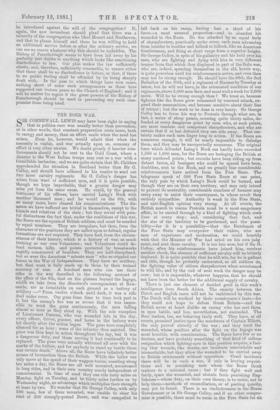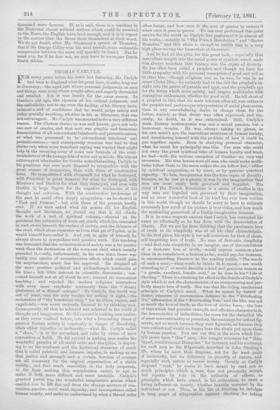THE BOER WAR.
SIR CORNEWALL LEWIS may have been right in saying that in politics cure was usually better than prevention, or in other words, that constant preparation costs more, both in energy and money, than an effort made when the need has arisen. Even he, however, would admit that when the necessity is visible, and war actually upon us, economy of effort is very often unwise. We doubt greatly if heavier rein- forcements should not be sent to the Gold Coast, where a disaster to the West Indian troops may cost us a war with a formidable barbarian; and we are quite certain that Mr. Childers apprehended the situation in Boerland better than Sir G. Colley, and should have adhered to his resolve to send out two more cavalry regiments. Sir G. Colley's danger has arisen from want of sufficient men, and it is quite possible, though we hope improbable, that a greater danger may arise yet from the same cause. He could, by the general testimony of his officers, have carried Laing's Neck with another thousand men ; and he would on the 8th, with as many more, have cleared his communications. The dis- asters we have suffered are trivial in themselves, except to the friends and relatives of the slain ; but they reveal with pain- ful distinctness the fact that, under the conditions of this war, the Boers are the equals of British soldiers, and must be assailed by equal numbers. They are irregulars, but then, from the character of the positions they are called upon to defend, regular formations are not required. They have had, from the circum- stances of their history, which is a history of war, as much training as our own Volunteers ; and Volunteers could de- fend ravines, hills, and points protected by breastworks rapidly constructed of boulders. They are half-disciplined, but so were the American " minute men " who so crippled our forces in the War of Independence. They have no artillery, but that want is fully made up to them by their trained accuracy of aim. A hundred men who can use their rifles in the way described in the following account of the affair of the 8th, that on the plateau beyond the Ingogo, whiCh we take from the Standard's correspondent at New- castle, are as formidable on such ground as a battery of artillery ;--" From twelve o'clock until dusk, it was a rifle duel under cover. Our guns from time to time took part in it, but the enemy's fire was so severe that it was impos- sible to work the guns continuously, the men falling almost as soon as they stood up. With the solo exception of Lieutenant Parsons, who was wounded late in the day, every officer, driver, gunner, and horse in the battery were hit shortly after the action began. The guns were completely silenced for an hour ; some of the infantry then assisted. One piece was thus kept in action throughout the day, but it was a dangerous duty, and those serving it had continually to be replaced. The guns were actually whitened all over with the marks of the bullets, and for anybody to stand up beside them was certain death." Above all, the Boers have infinitely better means of locomotion than the British. While the latter can
only move at the speed of their waggon-trains, crawling along ten miles a day, the Boers are all well mounted, accustomed to long rides, and in their own country nearly independent of commissariat. In time of need they can ride forty miles on Monday, fight on Tuesday, and be thirty miles further on by Wednesday night, an advantage which multiplies their strength at least by two. No wonder that Sir George Colley, with only 500 men, few of them mounted, was unable to clear his road of 500 strongly-posted Boers, and was compelled to
fall back on his camp, having lost a third of his force—a most unusual proportion—and to abandon his wounded to the Boers. He was attacked by an equal body of sharpshooters, practically under cover, each man advancing from boulder to boulder and hillock to hillock, like an American frontiersman, and firing at short range from a superior height. Sir George Colley, in spite of his gallantry and his hold over his men, who are fighting and dying with him in very different temper from that which they displayed in part of the Zulu war, who are, indeed, spending themselves in the old, heroic way, is quite powerless until his reinforcements arrive, and even then may not be strong enough. He should have the 98th, the 2nd Battalion of the 60th, and a regiment of Hussars by Tuesday at latest, but he will not have, in the attenuated condition of our regiments, above 2,400 men then, and must wait a week for 2,000 more. Will he be strong enough then ? We trust so, because fighters like the Boers grow exhausted by renewed attack, ex- pend their ammunition, and become sensitive about their line of retreat ; but the work to be done is very heavy. Sir George Colley has to force his way to Pretoria through what are, in fact, a series of steep passes, covering quite thirty miles, de- fended at every dangerous point by men who, at such points, are most resolute and competent sharpshooters, and who are certain that if at last defeated they can ride away. That cer- tainty makes such men linger long in action. If the Boers are numerous enough, it will be nearly impossible to dislodge them, and they may be unexpectedly numerous. The original force which defended Laing's Neck can hardly have exceeded 1,500 or 1,800 men, for the Boers are besieging the British at many scattered points ; but recruits have been riding up from distant farms, all besiegers who could be spared have been, doubtless, sent to the Neok, and we greatly fear considerable reinforcements have arrived from the Free State. The telegrams speak of 500 Free State Boers at one point, the only pass by which Laing's Neck could be turned, and though they are on their own territory, and may only intend to protect its neutrality, considerable numbers of farmers may creep away to assist their countrymen, in whose revolt they entirely sympathise. Authority is weak in the Free State, and anti-English opinion very strong. At all events, the British march to rescue Pretoria must be a most sanguinary affair, to be carried through by a kind of fighting which costs lives at every step ; and, considering that fact, and the size of the territory to be garrisoned, and the possi- bility—for it is a possibility—that the Dutchmen of the Free State may overpower their rulers, who are men of experience and moderation, we could heartily wish that the Minister of War had acted on his own judg ment, and sent those cavalry. It is too late now, but if Sir G. Colley, after his reinforcements have joined him, receives another chock, the absence of sufficient cavalry will be bitterly deplored. It is quite possible that he will win, for lie is gallant and able, though he probably underrated, as all soldiers do, the fighting value of citizen sharpshooters when accustomed to wild life, and by the end of next week the danger may be over ; but it is impossible, whatever happens, that he should not have been the better for the additional supply of cavalry. There is just one element of decided good in this week's intelligence from South Africa. The enmity between the Dutch and English races will not be embittered by this war. The Dutch will be soothed by their countrymen's feats—for they could not hope to defeat Great Britain—and the British never at heart dislike an enemy who has met them in open battle, and has, nevertheless, not succeeded. The Boor leaders, too, are behaving fairly well. They have, at all events, promised justice upon the murderers of Captain Elliott, the only proved atrocity of the war ; and they treat the wounded, whose position after the fight on the Ingogo was most horrible, with consideration. The Boers have few or no doctors, and have probably something of that kind of callous resignation which fighting-men in that position acquire, a feel- ing that wounds, like deaths, are incidents unavoidable and irremediable, but they allow the wounded to be carried away to British settlements without opposition. Cruel incidents there will be in such a war, if only in levying requisi- tions and in punishing men whom the Boers think traitors to a national cause ; but if they fight well and fairly, spare the wounded, and abstain from punishing Eng- lishmen—whose duty, on their own theory, is to resist, not to help them—methods of reconciliation, or of parting quietly, may yet be found. There is no vindictiveness in the Homo Government or in Sir George Colley, and if no other compro- mise is possible, there must be room in the Free State for six
thousand more farmers. If, as is said, there is a territory in the Transvaal almost without natives which could be reserved to the Boers, the English have land enough, and it is in regard to the natives that the Boers show themselves at their worst. We do not doubt, after Mr. Gladstone's speech of Thursday, that if Sir George Colley wins his next assault, some endurable compromise between the races will speedily be found. But he must win, for if he does not, we may have to reconquer Dutch South Africa.



































 Previous page
Previous page